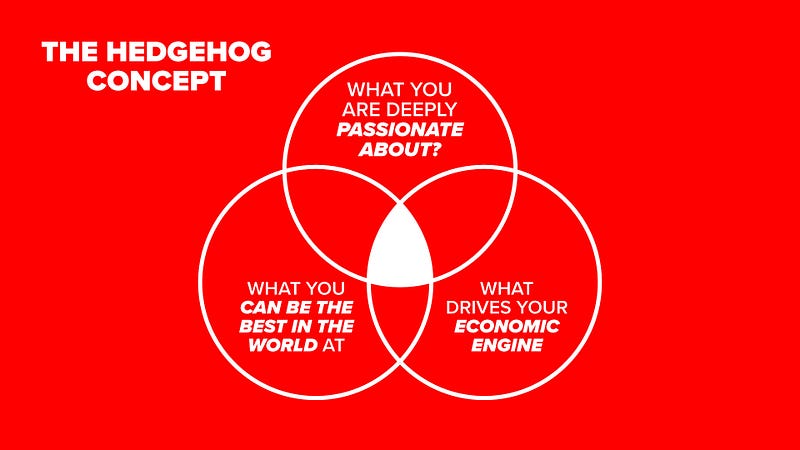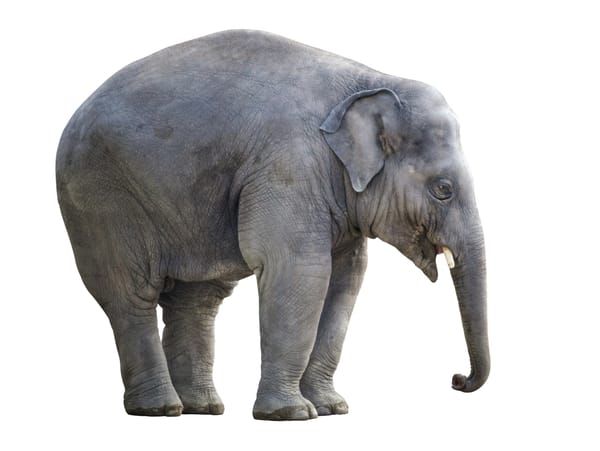Becoming a Hedgehog
What does “marketing yourself” even mean, anyway?

Last year, the leadership team at Nine Labs kicked off an initiative to transform our business using a simplified version of the EOS model — a framework designed to redefine and focus how you run a company. As part of this, we all read Jim Collins’ excellent Good to Great, a book detailing several case studies of companies that out-performed their competitors for long periods of time. One of Collins’ key findings was that each great company had what he described as a “hedgehog concept,” essentially one central, focused statement describing their business—comprised of what fueled their profits, what they were passionate about, and what they could be the best in the world at.

Are you a hedgehog or a fox? In his famous essay “The Hedgehog and the Fox,” Isaiah Berlin divided the world into hedgehogs and foxes, based upon an ancient Greek parable: “The fox knows many things, but the hedgehog knows one big thing.”
Those who built the good-to-great companies were, to one degree or another, hedgehogs. They used their hedgehog nature to drive toward what we came to call a Hedgehog Concept for their companies. Those who led the comparison companies tended to be foxes, never gaining the clarifying advantage of a Hedgehog Concept, being instead scattered, diffused, and inconsistent.
In the past month of doing battle with today’s ultra-competitive tech job market, I’ve started thinking a lot about this. Historically, I’ve prided myself on being a fox — if you ask me to do almost anything generally related to user experience design, I can do it pretty well. And a lot of job descriptions for designers seem to be catered to this. Whether intentionally or not, they tend to ask for a pretty exhaustive list of skills ranging from early-stage ethnographic research to diagramming to wireframes to polished UI design to design system development to massaging stakeholder egos to standing over a developer’s shoulder and telling them what CSS properties to use.
In reality, few jobs deeply need a person who can do all of those things with equal acuity. And often when UX designers attempt to do everything, they end up with scattered, diffused, and inconsistent outcomes. Sometimes, imperfectly doing too many things results in the impression that UXDs aren’t worth the money they cost or the time they add to the product development process. And even if someone does manage to keep all those plates spinning, it’s a recipe for personal burnout, or finding yourself bouncing from job to job at companies whose mission sucks the soul out of you.
One of the main benefits of a hedgehog concept to a business is that it focuses every aspect of operations, from figuring out which lines of business to invest in to identifying a target market to hiring the right staff. It gives you a quick and easy heuristic for decision-making: does this thing support our hedgehog concept? If so, it’s worth investing in. If not, it’s a distraction.
As a job-seeker, I’ve always struggled with the common career advice of “market yourself.” I took one marketing class in graduate school, and from what I remember, it was mostly about calculating statistical significance in survey results. So limited applicability to finding a job. However, I’ve recently started thinking about it in terms of how a hedgehog concept clarifies a target market. And I’ve begun wondering — what is my personal hedgehog concept?
As I can attest from our efforts at Nine Labs, the hard part about defining a hedgehog concept isn’t coming up with ideas, it’s the fact that you have to eliminate most of them. Because you can’t have a list of ten things you’re passionate about — you have to pick one thing. You can’t list off five things you’re pretty good at — you have pick the one thing you can be the best at.
Once you get there, though, theoretically every aspect of job-seeking (and even plotting your career growth path within a company) should be simpler. Is this job related to the thing you’re passionate about? Does it strongly need the skillset you’re the best at? Is it paying you enough to meet your financial goals? If not, it’s a waste of your time and energy. And from a designer’s perspective, it could help focus what’s worth including in your portfolio. What aspects of your work should you really drill down into and which can be glossed over or removed altogether?
Figuring out your passion and economic driver are relatively straightforward tasks. Trying to decide what you can be the best in the world at is harder. When you’re running a company, you can do some competitive research to figure out what other companies are in your industry and what they do. In contrast, there are probably hundreds of thousands of UX designers in the world, all with some variation of the same skillset. So that piece really does need to be targeted down with pinpoint precision. You’re going to have to be at the absolute peak of talent to be The Best in the World at UI Design. It’s significantly easier to be the Best in the World at UI Design for Primary Care Physician Software, and even easier to be The Best in the World at UI Design for Primary Care Physician iOS Apps for Companies East of the Mississippi.
Now, I say all of this as someone who still hasn’t fully figured out a personal hedgehog concept. I’m a fox trying to change my species. And I have plenty of anxieties about the things that might follow from narrowing my focus. It’s a tough market out there, and a lot of companies will never get back to you no matter how good a fit you are. Am I unnecessarily limiting my options if I set boundaries on the things I want to do? Am I going to make myself appear one-dimensional to recruiters? I honestly don’t know. We had these same anxieties when trying to figure out the agency’s hedgehog concept, but the data supports hedgehog-ness pretty uniformly.
So I’m going to try it, at least. And hopefully changing your species is possible.
Have you defined a personal hedgehog concept? If so, I’d love to hear about your experiences with it.




